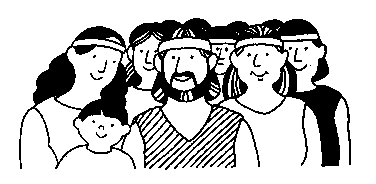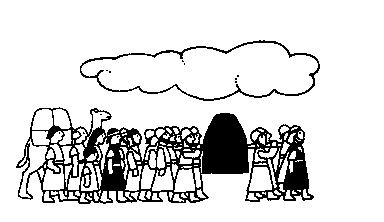
Who Are All These People?
The People of the New Testament
Most of the people in the
New Testament stories are Jewish, and most of them lived in or
around what is now modern Israel, which was called Palestine
during Jesus' lifetime (about 2000 years ago.)
Jesus is the center of our story. He keeps
the promises God made to his people that
a savior would come to save them from their sins. We learn about
his birth, life, death,
resurrection, and ascension.
Jesus often taught in parables, and
we look at the way that his followers began to live out his teachings.
Mary is Jesus' mother, wife of Joseph,
and cousin of Elizabeth, the mother
of John the Baptist.
Joseph
is Mary's husband, a builder or contractor who was a man of deep
personal honor. He was visited by angels.
John the Baptist
is the son of Mary's cousin, Elizabeth, who prepares the people
to listen to Jesus' teaching.
Peter is the first follower or student
(disciple) that Jesus asks to follow him.
Paul is the first follower of Jesus who
never met him in person while he was alive. Paul's life is a very
interesting example for those of us who have never met Jesus in
person either.
Luke is one of four writers of the Gospels,
the Good News, which is the story of Jesus' life. He probably
never met Jesus either, but he may have known some of Jesus' relatives.
Matthew, one of Jesus' twelve original disciples, wrote the first Gospel. His story does not seem to be an eyewitness account (even though he was present at most of the events that are related in his story), but rather a compilation of several written sources.
John also seems to be one of the twelve original disciples. His gospel comes from strong traditions of Jewish scholarship and is the least concerned with Jesus' life story.
Mark's family may have hosted the disciples in the Upper Room, and Mark, though not a disciple, probably met Jesus when Mark was a child or young man. His gospel was written before those of Matthew, Luke, and John.
Simon Peter and his brother Andrew were the first disciples Jesus chose. Following that call, Jesus called James and John, then Philip, Nathaniel (also called Bartholomew), Matthew, Thomas, and James, son of Alpheus, and Simon the Zealot, and Judas, son of James, and Judas Iscariot.
Mary Magdalene was an early follower from Galilee; she was the first person to speak to Jesus after his resurrection from the dead.
Many women followed and supported Jesus throughout his ministry. Dorcas and Lydia were early followers of the apostles.
Lazarus was a good friend of Jesus, who was often a houseguest in Bethany at the home of Lazarus and his sisters, Martha and Mary.
The Samaritans also believed in the One God, but the Judeans believed that the Samaritans worshiped God disrespectfully.
During Jesus' lifetime, there were four distinct Jewish groups, not exactly religious or political parties, but divisions who lived quite differently from one another. These groups were the Pharisees, the Sadducees, the scribes, and the Zealots.
Pharisees, Sadducees, scribes, and high priests made up the council of elders, the Sanhedrin.
Lepers were people who had the disease called leprosy, which was incurable in Bible times. Today the disease is called Hansen's disease and can be cured with modern medicines.
The early disciples of Jesus called themselves followers of The Way. The name Christian was first used in Antioch (Acts 11: 26), and Herod Agrippa called Paul a Christian in Acts 26.
Stephen, a Greek-speaking (or hellenized) Jew, was the first Christian to die for his faith in Jesus.
Many of the early Christians were slaves, and slavery to sin becomes a recurring theme in the New Testament.
The Herod family participated in the lives and deaths of Jesus and of his followers.
The People of the Old Testament
 The
people of the Old Testament stories lived much longer ago - perhaps
as long as 4000 years before Jesus was born. These people are
the very first to interact with God, so that he could show us
his plan for us through grace.
The
people of the Old Testament stories lived much longer ago - perhaps
as long as 4000 years before Jesus was born. These people are
the very first to interact with God, so that he could show us
his plan for us through grace.
Adam is the first man in the story of the creation of the earth. He is the first person on earth to hear God call his name and to answer him.
Noah was the only honorable person in his generation, and God saved him from the great flood.
Abraham was the first person with whom God made a covenant - a formal promise of what he would do for Abraham and his descendants.
Jacob was Abraham's grandson. Because of the bad behavior in his family, Jacob's son Joseph ended up in Egypt, where the descendent of Jacob eventually became slaves under the Egyptians.
Moses was called by God to lead the Israelites out of Egypt and back to the land that God had promised to Abraham and his descendants. Aaron was his brother, who spoke to Pharaoh for him.
Job, through great trials and difficulties, praised God.
Jonah shows us what happens when we don't listen to God's call, as well as what happens when we do.
Ruth was faithful and honorable in all her dealings, and even though she was not an Israelite, she holds an important part in Jesus' family tree as the great-grandmother of David.
King David united the Northern and Southern Kingdoms of Israel into one nation, with its capital at Jerusalem. David was anointed as king by Samuel, who was dedicated to the priesthood as a very small child. His son, Solomon, built the first Temple in Jerusalem.
Daniel, during his captivity in Babylon, saw visions and dreamed dreams.
Elijah was a prophet who was transported directly to heaven without dying; many of Jesus' followers thought that Jesus was Elijah returned from heaven. Elijah's disciple, Elisha, ministered to the people in the way Jesus did, many centuries before Jesus was born.